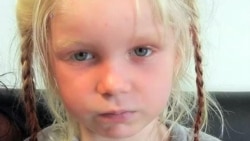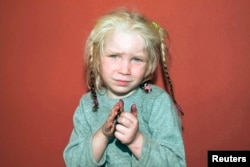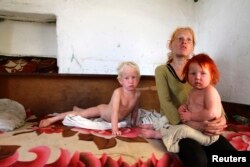ROME, ITALY —
A little blonde girl in Greece is at the center of a Europe-wide row over the treatment of Roma people - sometimes known as "gypsies." The girl, named Maria, was taken into care from a Roma community over fears she had been abducted. But it appears authorities may have gotten it wrong. In Rome, which has a big Roma population, there have been allegations of human rights abuses against Roma people across Europe.
When police raided a Roma camp in central Greece two weeks ago in search of drugs and weapons, they spotted a little blonde girl who looked nothing like her dark-haired parents or siblings.
DNA tests revealed the couple caring for her were not her real parents. They were charged with child abduction. But they insist Maria was given to them.
Maria’s real mother has now been found in Bulgaria - and she says she did give the child away in 2009 because she could not care for her. Police are investigating whether she was sold for money.
The lawyer for the Roma couple, Marietta Palavara, condemned the actions of the authorities.
“[E]veryone who is involved in this very serious issue must think about the fact that Maria grew up with these people, and that there is only a relationship of love between them," said Marietta Palavara.
There was speculation in the European media that Maria may have been stolen. Riccardo Noury of Amnesty International in Italy condemns the press coverage.
“It’s a very stereotyped way of depicting Roma communities all over Europe - here in Italy especially, and in Greece - as people who steal babies, people who don’t want to educate their children,” he said.
Charalambos Dimitriou, president of the Roma camp in Farsala where Maria was found, says the community feels unfairly targeted.
He said the entire community, all of Farsala, has cried for Maria, because she was always here around us. She was not locked in some basement, as some media were saying, he added.
In the days following the case in Greece, authorities in Ireland mistakenly removed two girls from Roma communities there, over concerns they may have been abducted.
In France earlier this month, 15-year-old Leonarda Dibrani was pulled off a school bus by police in front of other students, to be deported back to Kosovo.
The action triggered violent protests. French authorities insist Dibrani’s family had exhausted the asylum process.
Roma support groups accuse European governments of trying to appease the far right.
Riccardo Noury of Amnesty International Italy says, "They are victims of violent attacks by private groups. They are victims of human rights violations by law. In France or Italy or in other parts of Europe, they suffer from forced evictions based on the assumption that they are nomads.”
In Greece, meanwhile, the lawyer for the detained Roma couple is appealing for their release, and for Maria to be returned to their care. Greek authorities insist they have always acted in the best interests of Maria.
When police raided a Roma camp in central Greece two weeks ago in search of drugs and weapons, they spotted a little blonde girl who looked nothing like her dark-haired parents or siblings.
DNA tests revealed the couple caring for her were not her real parents. They were charged with child abduction. But they insist Maria was given to them.
Maria’s real mother has now been found in Bulgaria - and she says she did give the child away in 2009 because she could not care for her. Police are investigating whether she was sold for money.
The lawyer for the Roma couple, Marietta Palavara, condemned the actions of the authorities.
“[E]veryone who is involved in this very serious issue must think about the fact that Maria grew up with these people, and that there is only a relationship of love between them," said Marietta Palavara.
There was speculation in the European media that Maria may have been stolen. Riccardo Noury of Amnesty International in Italy condemns the press coverage.
“It’s a very stereotyped way of depicting Roma communities all over Europe - here in Italy especially, and in Greece - as people who steal babies, people who don’t want to educate their children,” he said.
Charalambos Dimitriou, president of the Roma camp in Farsala where Maria was found, says the community feels unfairly targeted.
He said the entire community, all of Farsala, has cried for Maria, because she was always here around us. She was not locked in some basement, as some media were saying, he added.
In the days following the case in Greece, authorities in Ireland mistakenly removed two girls from Roma communities there, over concerns they may have been abducted.
In France earlier this month, 15-year-old Leonarda Dibrani was pulled off a school bus by police in front of other students, to be deported back to Kosovo.
The action triggered violent protests. French authorities insist Dibrani’s family had exhausted the asylum process.
Roma support groups accuse European governments of trying to appease the far right.
Riccardo Noury of Amnesty International Italy says, "They are victims of violent attacks by private groups. They are victims of human rights violations by law. In France or Italy or in other parts of Europe, they suffer from forced evictions based on the assumption that they are nomads.”
In Greece, meanwhile, the lawyer for the detained Roma couple is appealing for their release, and for Maria to be returned to their care. Greek authorities insist they have always acted in the best interests of Maria.







